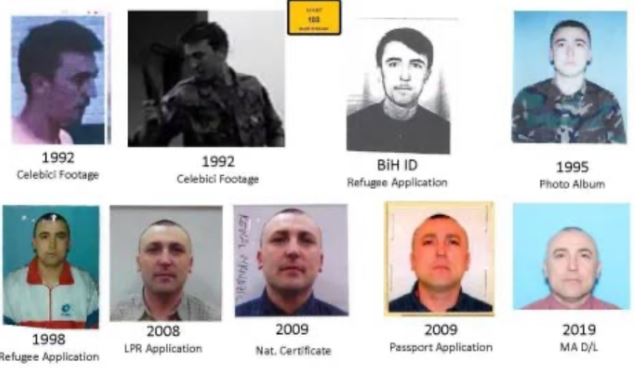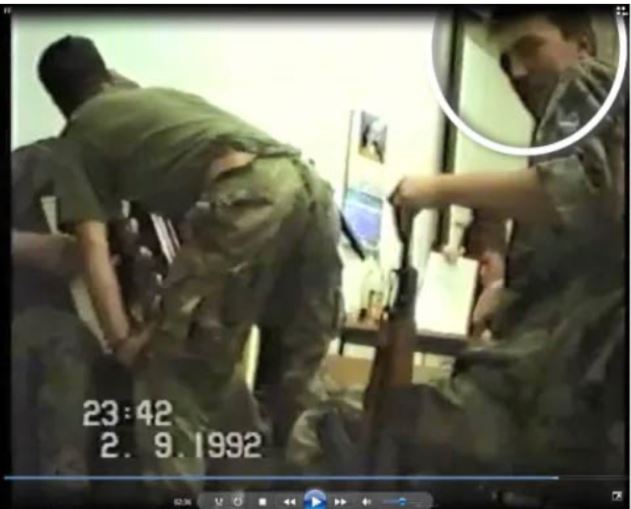
By Todd Bensman as published February 12, 2025 by the Center for Immigration Studies
Abrutal prison camp guard supervisor who oversaw horrific human rights atrocities during the Bosnian civil war, but who managed to gain a green card and U.S. citizenship anyway, is the latest addition to the Center for Immigration Studies National Security Vetting Failures Database. The entry brings the total number of failure cases analyzed to 51.
The addition of Bosnia national Kemal Mrndzic comes at a moment when President Donald Trump has signed executive orders requiring repairs and improvements to U.S. national security screening and vetting systems for all immigrant and non-immigrant visa applications. (See “Decoding Trump’s Border Counterterrorism Order, Part 2”.) The Center published the database collection in March 2023 to draw “remedial attention” to ongoing government vetting failures lest they “drift from the public mind and interest of lawmakers, oversight committee members, media, and homeland security practitioners who would otherwise feel compelled to demand process reforms”, according to an explanatory Center report titled “Learning from our Mistakes”.
The new failure addition of Mrndzic, a 50-year-old Bosnian Muslim who lived peacefully and prosperously in the coastal Boston suburb of Swampscott for decades, comes after his October 2024 conviction of criminally concealing his service as a supervisor of guards in 1992 at the notorious Celebici prison camp near Konjic, Bosnia, so that he could enter the United States as a refugee and later to become a lawful permanent resident and naturalized citizen despite his direct engagement in systematic rape, torture, assault, and murder.
The camp closed in December 1992 and Mrndzic went on to serve as commander of the Musala detention camp, another Serb POW camp detention camp that became widely known for brutal regular abuses of detainees, including murder, an HSI agent complaint stated. After the war ended, Mrndzic went into hiding and, in 1999 entered the United States on an approved refugee application based on an elaborate cover story he provided that went unchecked at the time and again a decade later when he applied for a green card and U.S. citizenship, both granted based on the original fake cover story.
As early as 1996, international investigative agencies were aware of Mrndzic’s crimes and had documented them, including at a major 1998 trial and conviction of four guards, one of whom used Mrndzic’s written testimony for his defense that placed him at the camp as a supervisor. American adjudicators later could have accessed these records at any time but never did.
Had they checked during any of three approval processes, two of them well after post 9/11 security screening reforms were in place, U.S. immigration adjudicators would have learned that dozens of his victims had described Mrndzic as one of the most brutal guards at the camp and had long since attested that he was widely known for his particularly vicious and flagrant public treatment of Serb prisoners.
An ICE HSI press release described Mrndzic as having participated in the “systematic and pervasive brutal torture and deprivation of basic human needs of hundreds of captive victims – some of whom were elderly – at the Celebici prison camp.”
He and guards under his command raped women in front of each other, sadistically tortured inmates at random with electric devices and heated knife blades, beat at least eight to death, and withheld food, water, and medicine. One survivor recounted the beating death of a 70-year-old detainee; guards had pinned a military badge on his forehead while he was dying. Mrndzic liked to practice “karate” moves on the inmates, three survivors claimed.

Kemal Mrndzic (circled at right) during his service as HSI found him in one of two videos. Source: HSI press release.
While in hiding from an international war crimes investigation in Croatia during 1998, Mrndzic applied for U.S. refugee status using a fraudulent cover story that he’d been captured by Serb forces at the war’s start and eventually escaped brutalities of the sort for which he was implicated. In 1998, prior to 9/11-era security vetting reform improvements, the U.S. Citizenship and Immigration Service (USCIS) representative accepted Mrndzic’s detectable frauds at face value.
“At the conclusion of the interview, and upon review of his completed forms … the immigration officer approved Mrndzic’s application as a refugee. In so doing, the immigration officer relied on Mrndzic’s written and oral false statements,” the agent complaint said.
He entered the United States in 1999 to settle in Massachusetts with his wife, who was also admitted as a refugee.
In 2008, long after U.S. implementation of more rigorous post-9/11 security vetting reforms, USCIS officers inside the United States approved Mrndzic’s application to become a lawful permanent resident, again accepting elaborate fake stories he’d originally concocted, the agent complaint said.
Again the following year, in April 2009, USCIS approved his application to become a naturalized U.S. citizen based on Mrndzic’s bogus storylines. (This was possible, just one year after receiving permanent residence, because, as the complaint notes, his “lawful permanent residence status was applied retroactively to his original admission date of March 4, 1999.”)
In fact, American adjudicators could have easily learned that Mrndzic had always been lying to cover up his crimes at the camps by just checking with the United Nations International Criminal Tribunal for the Former Yugoslavia (ICTY). HSI agents had no trouble finding these, plus videos and photographs of Mrndzic at the Celebici camp.
Key among this documentation in the major ICTY investigation of three Celebici camp guards, all later convicted, was information that Mrndzic had regularly engaged in and ordered the inmate abuses as head of security. The ICTY investigators were aware of the brutality allegations against Mrndzic and that he worked at the camp because they interviewed him that year, filing away the notes. While Mrndzic acknowledged working at the camp, he denied that any abuses took place there, contrary to dozens of survivor testimonials.
During his October 1996 ICTY interview, Mrndzic himself stated that “the ICTY investigator told him that the Tribunal knows and there is proof that he was involved in the alleged murder” of one prisoner at Celebici.
Furthermore, Mrndzic provided written testimony on behalf of one of the accused guards at the ICTY’s 1998 trial in The Hague, placing him at the camp in a position of authority, another missed clue that Mrndzic’s fake story given to immigration authorities was at odds with checkable reality.
Having been told ICTY had evidence against him, too, in 1996, Mrndzic began planning to emigrate to the United States as a refugee.
Agents of Homeland Security Investigations with the Human Rights Violators and War Crimes Center caught up to Mrndzic in 2022 and showed him the 1996 interview statements they’d retrieved, as USCIS officers should have years earlier. HSI agents also were able to find video recordings taken at Celebici in 1992 in which he appeared in uniform holding a rifle, and military photos too. They also found plenty of victims willing to provide testimony and brought immigration fraud charges. He was indicted in June 2023.
On October 18, 2024, following a two-week jury trial in Boston, a jury convicted Mrndzic. A judge sentenced him to 65 months in prison.
“For over two decades, Mr. Mrndzic evaded accountability for his participation in the persecution and torture of countless victims at the camp,” U.S. Attorney Leah B. Foley said in a January 23, 2025, press release. “This case underscores that we will not allow our nation to be a refuge for those who seek to escape justice. The government will be working to ensure that his fraudulently obtained U.S. citizenship is revoked.”